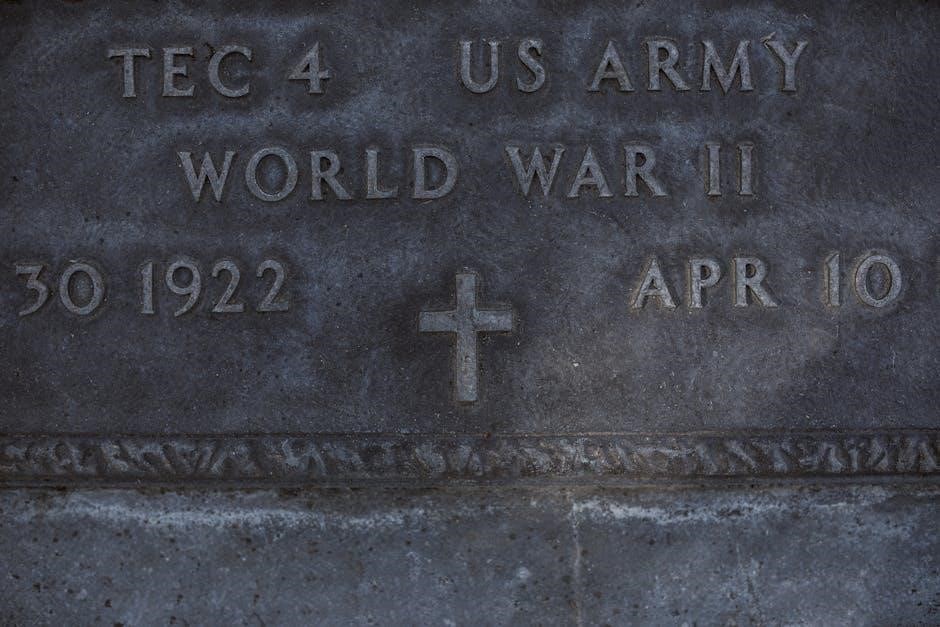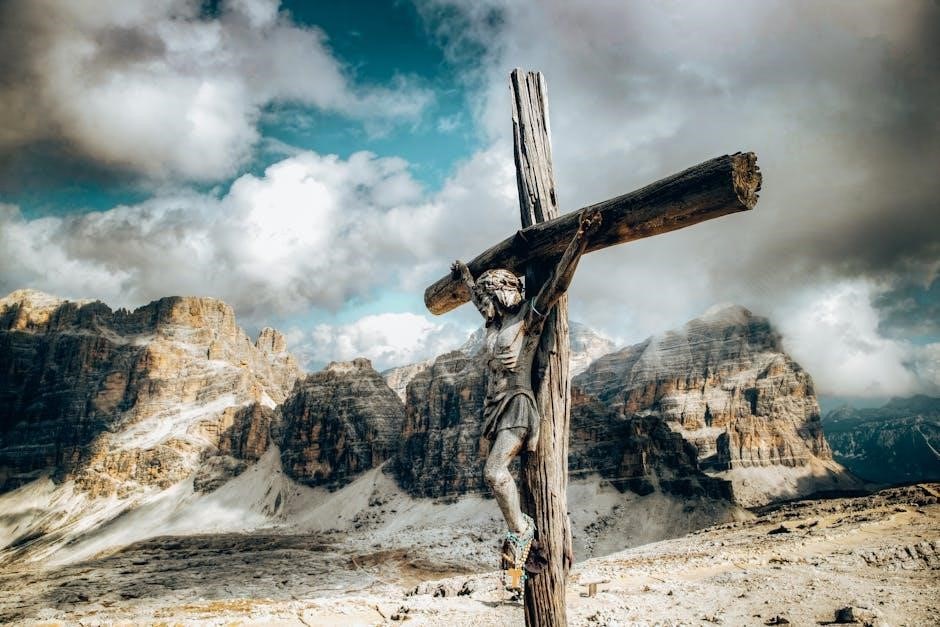
the sacrifice pdf
The depth of God’s love is revealed through the theme of sacrifice, from Old Testament rituals to Christ’s ultimate sacrifice, emphasizing redemption and transformative power in human history.
1.1 Overview of the Theme of Sacrifice
The theme of sacrifice is deeply rooted in religious and cultural traditions, symbolizing devotion, redemption, and the surrender of valued things for a greater purpose. It is a universal concept that transcends boundaries, reflecting humanity’s quest for meaning and connection with the divine. In Christianity, the ultimate expression of sacrifice is found in Christ’s self-offering, which embodies love, forgiveness, and the fulfillment of divine plans. Sacrifice also appears in the Old Testament through various rituals and offerings, serving as a means of atonement and communion with God. This theme highlights the transformative power of surrender and the moral commitment to prioritize higher values over personal desires.
1.2 Importance of Understanding Sacrifice in Religious Contexts
Understanding sacrifice in religious contexts is crucial for grasping the core teachings and practices of many faiths. It provides insight into the beliefs, values, and rituals that shape spiritual life. Sacrifice often symbolizes devotion, atonement, and the commitment to a higher purpose. In religious traditions, sacrifices are not just physical acts but also spiritual, representing the surrender of self-interest for divine will. This understanding fosters deeper connections to faith communities and their histories. It also reveals how sacrifice has been a unifying force across cultures, bridging the gap between the human and the sacred. Exploring this theme enriches one’s spiritual journey and appreciation of religious heritage.
1.3 Purpose of the Article
The purpose of this article is to explore the profound concept of sacrifice, delving into its historical, religious, and contemporary significance. By examining the theme of sacrifice, the article aims to provide a comprehensive understanding of its role in shaping human beliefs, practices, and cultures. It seeks to uncover the deeper meanings behind sacrificial acts, whether spiritual, emotional, or physical. Through this exploration, the article hopes to inspire reflection on the value of sacrifice in personal and collective contexts. Ultimately, it strives to bridge the gap between ancient traditions and modern interpretations, offering insights that resonate across diverse perspectives and experiences.

Historical Context of Sacrifice
The historical context of sacrifice reveals its origins in ancient cultures, where rituals were performed to appease deities, ensure fertility, and maintain cosmic order over millennia.

2.1 Sacrifices in the Old Testament
In the Old Testament, sacrifices were central to Israel’s worship, serving as a means of atonement, fellowship, and obedience to God. The Levitical system detailed various offerings, including burnt offerings, sin offerings, and peace offerings, each with specific rituals and purposes. These sacrifices were performed at the Tabernacle and later the Temple, emphasizing purity, forgiveness, and restoration of relationship with God. The High Priest played a pivotal role, particularly on the Day of Atonement, where he offered sacrifices for the nation’s sins. These practices underscored God’s holiness and humanity’s need for redemption, laying the theological foundation for the concept of sacrifice in both the Old and New Testaments.
2.2 The Evolution of Sacrificial Practices
The evolution of sacrificial practices reflects a dynamic interplay between religious traditions and cultural shifts. Early sacrificial rites, rooted in ancient customs, gradually took on more structured forms, particularly in the Levitical system. Over time, the symbolism and purpose of sacrifices adapted to historical contexts, such as the transition from nomadic to settled life. The destruction of the Temple in 70 CE marked a pivotal shift, leading to the decline of blood sacrifices and the rise of synagogue worship. This transformation emphasized prayer, study, and ethical living as new forms of spiritual offering. The evolution underscores how sacrificial practices remained relevant by adapting to changing circumstances while preserving core theological meanings.

2.3 The Role of Sacrifice in Ancient Religions
Sacrifice played a pivotal role in ancient religions, serving as a means to connect with the divine, appease deities, and maintain cosmic order. Across cultures, sacrifices were believed to bridge the earthly and spiritual realms, ensuring prosperity, forgiveness, and divine favor. Rituals often involved offerings of animals, crops, or precious items, symbolizing devotion and submission. Sacrifice also reinforced social hierarchies, as priests mediated between the people and the gods. In many traditions, sacrifices were communal acts, fostering unity and shared identity. The practice varied widely, from blood offerings to symbolic gestures, yet its significance as a sacred duty remained consistent. Sacrifice was not just a religious act but a cornerstone of ancient societal and spiritual life.

The Ultimate Sacrifice in Christianity
The ultimate sacrifice in Christianity is Jesus Christ’s voluntary death, symbolizing divine love and redemption. His sacrifice atones for humanity’s sins, offering eternal salvation and forgiveness.
3.1 The Sacrifice of Christ and Its Significance
The sacrifice of Christ is central to Christian theology, representing the ultimate expression of divine love and redemption. Jesus willingly surrendered his life to atone for humanity’s sins, fulfilling the demands of justice and reconciling people to God. This act of self-giving love demonstrates God’s mercy and grace, offering forgiveness and eternal life to all who accept it. Christ’s sacrifice is unique, as it was once-for-all, replacing the repetitive sacrifices of the Old Testament. It embodies the depth of God’s love and provides the basis for salvation, making it the cornerstone of Christian faith and the ultimate example of sacrifice;
3.2 The Fulfillment of Old Covenant Sacrifices in Christ
Christ’s sacrifice marked the fulfillment of the Old Covenant’s sacrificial system, which had long anticipated a perfect, once-for-all offering. The repetitive animal sacrifices of the Old Testament symbolized atonement but could never permanently remove sin. Christ, as the perfect High Priest, offered himself as the spotless Lamb of God, satisfying the divine requirement for justice. His sacrifice superseded the need for repeated offerings, establishing a new covenant rooted in grace. Through his death, Christ perfected believers, granting them direct access to God. This fulfillment signifies the completion of God’s plan, transitioning from shadow to reality, and ushering in an eternal priesthood of believers under Christ’s leadership.

3.3 The Transformative Power of Christ’s Sacrifice
Christ’s sacrifice holds profound transformative power, reshaping the spiritual landscape of humanity. Through his death and resurrection, believers experience reconciliation with God, moving from darkness to light. This act of redemption liberates individuals from the bondage of sin, empowering them to live according to God’s will. The sacrifice fosters spiritual rebirth, renewing hearts and minds, and enabling believers to reflect God’s love in their lives. It also establishes a covenant of grace, where faith in Christ becomes the foundation of salvation. The transformative power of Christ’s sacrifice continues to inspire lives, offering hope, forgiveness, and eternal life to all who embrace it.

Psychological and Philosophical Perspectives on Sacrifice
Sacrifice reflects deep psychological and philosophical dimensions, exploring altruism, selflessness, and ethical decision-making, influencing personal growth and societal well-being through selfless acts.
4.1 The Meaning of Sacrifice in Human Life
Sacrifice in human life signifies the act of giving up something precious for a greater cause, others, or a higher purpose. Rooted in altruism and selflessness, it embodies profound emotional and ethical dimensions. By prioritizing others’ needs over personal desires, individuals often find a deeper sense of purpose and moral clarity. Sacrifice fosters empathy and strengthens interpersonal bonds, while also promoting personal growth by challenging individuals to transcend self-interest. It is not merely about loss but also about the transformative power that can lead to profound fulfillment and societal well-being. Ultimately, sacrifice reflects the human capacity for love, compassion, and commitment to meaningful ideals.
4;2 Sacrifice as an Act of Love and Devotion
Sacrifice, as an act of love and devotion, transcends mere duty, embodying a profound commitment to others or a higher purpose. It often involves selfless giving, where personal desires are set aside for the well-being of loved ones or a cherished cause. This act fosters deep emotional bonds, reinforcing trust and loyalty. In relationships, sacrifice can strengthen connections, demonstrating unwavering dedication and care. Historically, acts of devotion have inspired remarkable sacrifices, showcasing the power of love to motivate extraordinary actions. Ultimately, sacrifice as an expression of love highlights the human capacity for generosity and the transformative impact of prioritizing others’ needs above one’s own.
4.3 Moral and Ethical Frameworks Surrounding Sacrifice
Moral and ethical frameworks surrounding sacrifice explore the principles guiding decisions to give up something valuable for a greater good. These frameworks often weigh the motivations behind sacrifice, such as altruism, duty, or personal beliefs. Ethical dilemmas arise when balancing self-interest with the needs of others, raising questions about the morality of sacrificial acts. Philosophical perspectives like utilitarianism and deontology offer lenses to evaluate sacrifice, emphasizing outcomes versus duties. Cultural and religious teachings further shape these frameworks, influencing perceptions of right and wrong. Ultimately, ethical sacrifice requires a careful consideration of intentions, consequences, and the greater good, ensuring that acts of sacrifice align with moral integrity and justice.

Sacrifice in Modern Contexts
Sacrifice in modern times involves personal, cultural, and societal choices, reflecting evolving values and challenges. It remains a powerful act of commitment and transformation in contemporary life.

5.1 Personal Sacrifices in Everyday Life
In modern life, personal sacrifices often involve choices that prioritize others or greater goals over individual desires. Many people sacrifice time, comfort, or hobbies to support family, advance careers, or pursue education. For instance, working overtime, relocating for opportunities, or forgoing leisure activities are common forms of sacrifice. These acts demonstrate commitment and responsibility, reflecting values like love, duty, and ambition. While sacrifices can be emotionally challenging, they often bring a sense of fulfillment and purpose; In a fast-paced world, personal sacrifices highlight the enduring importance of selflessness and resilience, even in secular contexts. They remain a cornerstone of human relationships and personal growth.
5.2 Cultural and Religious Practices of Sacrifice Today
Modern cultural and religious practices of sacrifice vary widely, reflecting diverse traditions and beliefs. In many religions, such as Islam, Hinduism, and Christianity, sacrifice remains a significant ritual, often symbolizing devotion, atonement, or gratitude. For example, in Islam, Eid al-Adha involves the sacrifice of animals to commemorate Abraham’s obedience. In Hinduism, offerings to deities, like food or flowers, are common. Even in secular contexts, cultural practices, such as community service or charitable acts, can be seen as forms of sacrifice. These practices not only preserve ancient traditions but also foster a sense of unity and shared purpose among participants. They continue to play a vital role in shaping spiritual and cultural identities globally.

5.3 The Relevance of Sacrifice in Contemporary Society
Sacrifice remains deeply relevant in contemporary society, transcending religious contexts to influence personal and societal dynamics. In modern life, sacrifice often manifests as acts of selflessness, such as caregiving, volunteering, or standing up for justice, even at personal cost. It fosters empathy and strengthens interpersonal bonds, promoting a sense of community. Sacrifice also encourages resilience and growth, as individuals confront challenges for the greater good. In a world increasingly focused on individualism, the concept of sacrifice serves as a powerful reminder of the value of putting others first. Its enduring relevance lies in its ability to inspire hope, unity, and transformation, making it a timeless and universal principle.
6.1 Summarizing the Significance of Sacrifice
Sacrifice embodies profound spiritual, cultural, and personal dimensions, reflecting humanity’s pursuit of meaning and connection. It transcends religious boundaries, symbolizing devotion, redemption, and renewal. Historically, sacrifice has been a cornerstone of religious rituals, bridging the divine and human realms. Beyond religion, it represents selflessness, love, and commitment, shaping moral and ethical frameworks. Sacrifice fosters community, inspires personal growth, and highlights the value of giving for a greater cause. Its enduring relevance in modern life underscores its universal appeal, reminding us of the transformative power of relinquishing something precious for the sake of others or a higher purpose;
6.2 Encouragement to Reflect on Personal Sacrifices
Reflecting on personal sacrifices invites introspection and growth, allowing individuals to understand their values and commitments better. By acknowledging the sacrifices made in daily life, whether significant or subtle, one can appreciate the depth of their dedication to others and their goals. This reflection fosters a sense of purpose and fulfillment, highlighting the importance of aligning actions with what truly matters. Encouraging self-examination of sacrifices encourages personal development and strengthens resilience. It inspires mindfulness of the choices made and their impact on oneself and others. Additionally, recognizing personal sacrifices can lead to gratitude for the opportunities and support received along the way. Ultimately, reflecting on personal sacrifices empowers individuals to lead more intentional and meaningful lives, enriched by the understanding of their own contributions and the value they hold.
6.3 The Enduring Legacy of Sacrifice in Human History
The legacy of sacrifice is deeply ingrained in human history, shaping cultures, religions, and societies across generations. From ancient rituals to modern acts of devotion, sacrifice has served as a universal language of commitment and transcendence. Its enduring presence highlights humanity’s capacity for selflessness and the pursuit of greater meaning. Sacrifice has inspired countless acts of courage, fostering resilience and unity in the face of adversity. As a timeless concept, it continues to influence contemporary thought, reminding us of the value of putting others or higher ideals above oneself. The legacy of sacrifice remains a powerful testament to the human spirit, guiding future generations to embrace the profound impact of giving and surrendering for the greater good.
Related posts:
Archives
- January 2026
- December 2025
- November 2025
- October 2025
- September 2025
- August 2025
- July 2025
- June 2025
- May 2025
- April 2025
- March 2025
- February 2025
- January 2025
- December 2024
- November 2024
- October 2024
- September 2024
- August 2024
- July 2024
- June 2024
- May 2024
- April 2024
- March 2024
- February 2024
- January 2024
- December 2023
- November 2023
- October 2023
- September 2023
- August 2023
- July 2023
- June 2023
- May 2023
Calendar
| M | T | W | T | F | S | S |
|---|---|---|---|---|---|---|
| 1 | ||||||
| 2 | 3 | 4 | 5 | 6 | 7 | 8 |
| 9 | 10 | 11 | 12 | 13 | 14 | 15 |
| 16 | 17 | 18 | 19 | 20 | 21 | 22 |
| 23 | 24 | 25 | 26 | 27 | 28 | |
Leave a Reply
You must be logged in to post a comment.